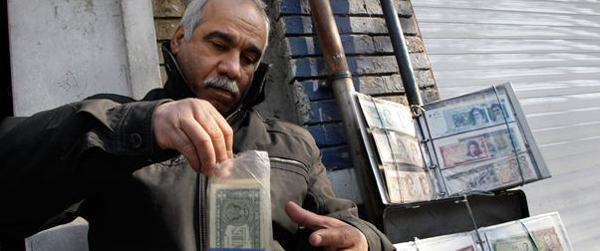
Stop Fundamentalism – “The bazaar is quiet in a very strange way,” told a merchant in Kuwaity bazaar located at the heart of the greater Tehran Bazaar to INA News reporter, Monday.
The bazaar has a central situation in Tehran. Usually at this time of the year – only two months before the Persian traditional New Year – it is very busy. But this Monday, during the heaviest business hours of the day, you could only see merchants walking around. There are no customers, INA reports. “At the same time last year, there was heavy commercial activity here.”
The reason is that neither merchants and nor their customers have much money to spend.
The problem can also be seen in other parts of the country as well. In the southern Iranian city, Ahwaz, inflation is pressing the middle and low level income families. INA reports that most in-demand products are very hard to find and if found, they are very expensive. For example, each kilo of rice, which makes a good part of Iranian main diet, is sold at 30,000 Rials.
Meanwhile reports from Iran indicate a continuous rise in the value of Dollar. Dollar was sold at 35,000 Rials in Tehran money exchange market Monday. That is an almost 200 Rials rise in less than two days.
“We are engaged in a foreign-exchange war,” told an official of the Information Ministry of the Islamic Republic to the Iranian media.
Iran’s currency value has dropped over 55 percent in less than a year, according an Iranian Parliament member Ahmed Tavakoly.
The fall in the value of Iran’s currency, Rial, is being attributed to problems the Islamic Republic is facing in exporting of its oil and also in transferring of foreign currency into the country. The problems follow mounting international sanctions imposed on the country due to Iran’s insistence on continuing a suspicious nuclear program which has many to believe it is geared towards military aims. President Ahmadinejad’s policies are also blamed by many internal critics for the currency crisis.
A Farsi language opposition website, Hambastegimeli.com reports that due to budget crisis and lack of adequate programming, the government is facing a crippling budget crisis. For example many retired government personnel have not been paid for almost three months, says Hambastegi Meli.
According to Hambastegi, international sanctions have severely affected important sectors of Iranian regime’s economy. Western countries are trying to prevent the regime from access to foreign exchange through pressures on its Central Bank.
Iran has been trying to circumvent international sanctions to overcome the over 50 percent fall of its currency value and also a 27 inflation which is crippling its economy.
Western countries expect that if Iranian regime would not back down from its nuclear program and give in to international demands, the pressures would bring down the Islamic Republic government.







